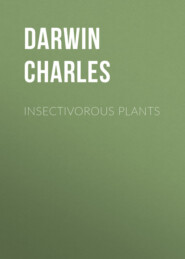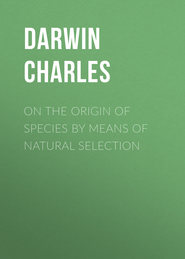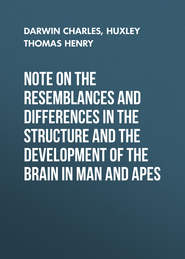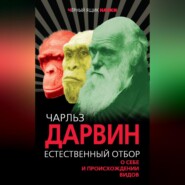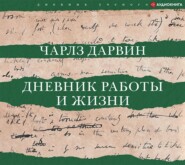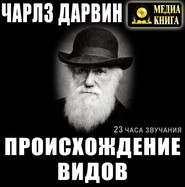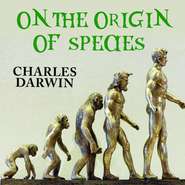По всем вопросам обращайтесь на: info@litportal.ru
(©) 2003-2024.
✖
Charles Darwin: His Life Told in an Autobiographical Chapter, and in a Selected Series of His Published Letters
Настройки чтения
Размер шрифта
Высота строк
Поля
45
Addressed to Mr. J. Fordyce, and published by him in his Aspects of Scepticism, 1883.
46
October 1836 to January 1839.
47
My father asks whether we are to believe that the forms are preordained of the broken fragments of rock which are fitted together by man to build his houses. If not, why should we believe that the variations of domestic animals or plants are preordained for the sake of the breeder? "But if we give up the principle in one case, … no shadow of reason can be assigned for the belief that variations alike in nature and the result of the same general laws, which have been the groundwork through natural selection of the formation of the most perfectly adapted animals in the world, man included, were intentionally and specially guided." —Variation of Animals and Plants, 1st Edit. vol. ii. p. 431. – F. D.
48
The Origin of Species.
49
Dr. Gray's rain-drop metaphor occurs in the Essay, Darwin and his Reviewers (Darwiniana, p. 157): "The whole animate life of a country depends absolutely upon the vegetation, the vegetation upon the rain. The moisture is furnished by the ocean, is raised by the sun's heat from the ocean's surface, and is wafted inland by the winds. But what multitudes of rain-drops fall back into the ocean – are as much without a final cause as the incipient varieties which come to nothing! Does it therefore follow that the rains which are bestowed upon the soil with such rule and average regularity were not designed to support vegetable and animal life?"
50
The Duke of Argyll (Good Words, April 1885, p. 244) has recorded a few words on this subject, spoken by my father in the last year of his life. " … in the course of that conversation I said to Mr. Darwin, with reference to some of his own remarkable works on the Fertilisation of Orchids, and upon The Earthworms, and various other observations he made of the wonderful contrivances for certain purposes in nature – I said it was impossible to look at these without seeing that they were the effect and the expression of mind. I shall never forget Mr. Darwin's answer. He looked at me very hard and said, 'Well, that often comes over me with overwhelming force; but at other times,' and he shook his head vaguely, adding, 'it seems to go away.'"
51
Dr. Aveling has published an account of a conversation with my father. I think that the readers of this pamphlet (The Religious Views of Charles Darwin, Free Thought Publishing Company, 1883) may be misled into seeing more resemblance than really existed between the positions of my father and Dr. Aveling: and I say this in spite of my conviction that Dr. Aveling gives quite fairly his impressions of my father's views. Dr. Aveling tried to show that the terms "Agnostic" and "Atheist" are practically equivalent – that an atheist is one who, without denying the existence of God, is without God, inasmuch as he is unconvinced of the existence of a Deity. My father's replies implied his preference for the unaggressive attitude of an Agnostic. Dr. Aveling seems (p. 5) to regard the absence of aggressiveness in my father's views as distinguishing them in an unessential manner from his own. But, in my judgment, it is precisely differences of this kind which distinguish him so completely from the class of thinkers to which Dr. Aveling belongs.
52
The figure in Insectivorous Plants representing the aggregated cell-contents was drawn by him.
53
Life and Letters, vol. iii. frontispiece.
54
The basket in which she usually lay curled up near the fire in his study is faithfully represented in Mr. Parson's drawing given at the head of the chapter.
55
Cf. Leslie Stephen's Swift, 1882, p. 200, where Swift's inspection of the manners and customs of servants are compared to my father's observations on worms, "The difference is," says Mr. Stephen, "that Darwin had none but kindly feelings for worms."
56
The words, "A good and dear child," form the descriptive part of the inscription on her gravestone. See the Athenæum, Nov. 26, 1887.
57
Some pleasant recollections of my father's life at Down, written by our friend and former neighbour, Mrs. Wallis Nash, have been published in the Overland Monthly (San Francisco), October 1890.
58
Darwin considéré au point de vue des causes de son succès (Geneva, 1882).
59
My father related a Johnsonian answer of Erasmus Darwin's: "Don't you find it very inconvenient stammering, Dr. Darwin?" "No, Sir, because I have time to think before I speak, and don't ask impertinent questions."
60
This is not so much an example of superabundant theorising from a small cause as of his wish to test the most improbable ideas.
61
That is to say, the sexual relations in such plants as the cowslip.
62
The racks in which the portfolios were placed are shown in the illustration at the head of the chapter, in the recess at the right-hand side of the fire-place.
63
He departed from his rule in his "Note on the Habits of the Pampas Woodpecker, Colaptes campestris," Proc. Zool. Soc., 1870, p. 705: also in a letter published in the Athenæum (1863, p. 554), in which case he afterwards regretted that he had not remained silent. His replies to criticisms, in the latter editions of the Origin, can hardly be classed as infractions of his rule.
64
"On Tuesday last Charles Darwin, of Christ's College, was admitted B.A." —Cambridge Chronicle, Friday, April 29th, 1831.
65
Readers of Calverley (another Christ's man) will remember his tobacco poem ending "Hero's to thee, Bacon."
66
The rooms are on the first floor, on the west side of the middle staircase. A medallion (given by my brother) has recently been let into the wall of the sitting-room.
67
For instance in a letter to Hooker (1817): – "Many thanks for your welcome note from Cambridge, and I am glad you like my Alma Mater, which I despise heartily as a place of education, but love from many most pleasant recollections."
68
Autobiography p. 10.
69
From a letter to W. D. Fox.







